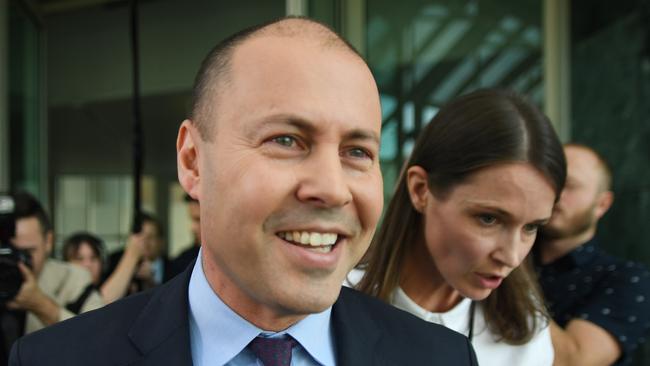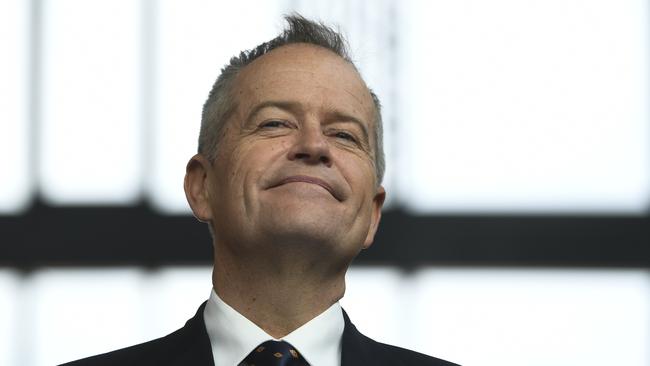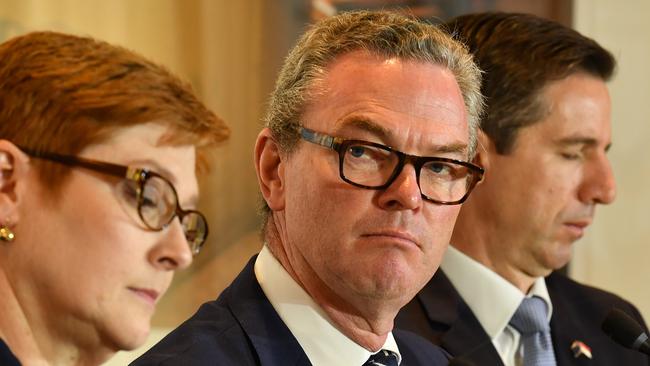Morrison should not wait too long to call the election post-Budget
There was a lot of noise this week. Scott Morrison impersonated Borat, Christopher Pyne quoted the Greek philosopher Plutarch, Josh Frydenberg showed off his 1980s mullet and Bill Shorten recharged an electric car.
NSW
Don't miss out on the headlines from NSW. Followed categories will be added to My News.
There was a lot of noise this week. Scott Morrison impersonated Borat, Christopher Pyne quoted the Greek philosopher Plutarch, Josh Frydenberg showed off his 1980s mullet and Bill Shorten recharged an electric car.
The Liberals ripped off an idea from former New Zealand prime minister John Key and all posed in shirtsleeves for moody “Back in Black” photos. The Opposition leader decided to show off his jogging style around Lake Burley Griffin.
And that’s before we get to the menu of policy offerings.
What were voters to make of it all and what will stick in their minds until election day?
Josh Frydenberg had three difficult tasks in his first Budget: boosting a sluggish economy, charting a credible path to surplus and saving the government’s political neck.
He’s succeeded on the first two fronts. The modest cash splash and targeted tax cuts should help the economy. And while we’re not back in black yet, the promise of a surplus next year is believable.

As for reviving the Coalition’s political fortunes, it’s too early to know. Budgets rarely produce a bounce these days, but both sides are watching closely.
On Tuesday night, after Frydenberg’s speech, focus group testing was carried out for both the Liberal and Labor parties.
The Liberal research showed a positive response for both the Treasurer and his Budget. The tax cuts and return to surplus went down well. Voters warmed to Frydenberg and gave his extra spending on infrastructure and mental health a tick.
Labor’s research on Tuesday night also showed that the tax cuts were welcomed and that the word “surplus” had cut through with those watching the speech.
However, when told the surplus was a result of “short-changing” the National Disability Insurance Scheme, the positive mood quickly turned to white-hot anger in the Labor focus group sessions.

This explains why Labor has run the same line about short-changing the NDIS so strongly this week — including in Shorten’s Budget reply speech.
The government says this is a blatant lie. The idea this surplus is built on the back of people with a disability is “shameful”, according to the Prime Minister, who points out the government has fully funded the NDIS and made enough money available to meet demand.
The problem is demand hasn’t kept up because the rollout has been too slow. Of the Commonwealth funding allocated to the NDIS this year, $1.6 billion remains unspent, mainly thanks to delays in processing claims and allocating care plans.
The government has returned this $1.6 billion to the Budget. Labor argues it should be spent on service providers and better support for people with a disability. Expect to hear more from Labor on this front.
It’s legitimate to debate where this “underspend” should go, but to suggest Morrison is heartless in this area is unfair.

He took a while to agree to a royal commission into the abuse of people with disabilities, but ultimately funded it properly in this week’s Budget, to the tune of more than $500 million. Yesterday he choked up as he announced details of what will be a thorough inquiry.
On the tax front, Shorten used his Budget reply speech to sharpen differences with the government. He’s promised more relief for low-income earners, but will slug those who are better off. The top income earners would pay one of the highest rates in the world at 49 per cent.
The unstated message is that these folks won’t vote for Labor anyway.
But Shorten doesn’t want an election fought over tax. He wants a campaign contest on health and education.
His main offering on Thursday night was a $2.3 billion Medicare Cancer Plan, a promise to roll out more free MRI scans and consultations for cancer patients.
It is a classic higher-taxing, higher-spending Labor approach, but also a politically astute move.

Nearly every family has been touched by cancer and knows how the fight to stay well can also involve a fight to avoid going broke.
Not surprisingly, Shorten’s plan went down extremely well and filled the airwaves yesterday.
Now the government is having to talk up its own efforts in listing cancer drugs and rolling out MRI machines.
This is exactly where Labor wants the debate to be at the end of Budget week.
The Prime Minister will be carefully weighing his options now.
Some of his colleagues say he should wait another week before calling the election and try shifting the focus back onto tax and the Coalition’s superior budget record.
An extra week would also allow the government to roll out taxpayer-funded ads.
On the flip-side, waiting would also mean another week of Senate estimates hearings where Labor can grill government ministers and department chiefs and generally cause trouble.
Morrison may have more detailed data at his disposal, but it’s not immediately obvious that Budget week has shifted the needle much in the government’s favour.
Hanging on for another week may prove to be a big mistake.
Originally published as Morrison should not wait too long to call the election post-Budget


